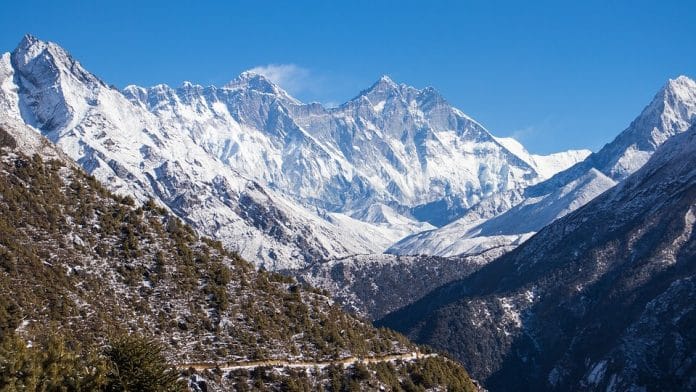Fatal ascents
Stephen Alter | Writer and author
The Indian Express
Lamenting the disappearance and likely death of eight climbers on Nanda Devi East in Uttarakhand, Alter speaks about the leader of this expedition Martin Moran’s unique approach to mountaineering. He quotes from Moran’s memoir in which the latter writes how mountain climbing is a “triumph of human spirit over the shackles of convention”. Alter also refers to the commercialisation of Everest climbing these days and calls Moran’s approach an “antithesis” to what is happening atop the world’s highest peak. He adds that mountaineering can be “fatal” and “perilous” but for those who take these risks it is part of a “tragic fascination for high places”.
The government alone can’t ensure clean air
C.K. Mishra| Secretary, Ministry of Environment, Forest and Climate Change
Hindustan Times
On World Environment Day, Mishra writes how India probably faces the “biggest and most wide-ranging risks” of air pollution with cities such as Delhi, Varanasi, Kanpur and the “entire Gangetic plain” listed by many as “most polluted” in the world. He says that the government alone cannot fight this challenge. The National Clean Air Programme (NCAP), launched in 2019, is a collaborative effort and has brought together ministries, state governments, civil societies and other groups to focus on India’s 102 most-polluted cities. He cites the example of states such as Haryana and Punjab – which have been working to reduce burning of crop stubble – Telangana, Kerala and Delhi – working to introduce more electric vehicles.
Fine-tuning the education policy
Amitabha Bhattacharya | Retired IAS officer
The Hindu
Bhattacharya calls some features of the new draft National Education Policy, 2019, “progressive” but also lists out roadblocks in their implementation. The recommendation to double public funding to 6% of the GDP and increasing public expenditure on education to 20% is “desirable” he says, but not “feasible” since “most of the additional funding has to come from the states”.
He also argues that the Central Institute of Indian Languages in Mysuru should take care of Pali, Prakrit and Persian instead of establishing new institutes for these languages. Bhattacharya adds that an amendment to the Right to Education Act, to include pre-school children, can “wait for a while” considering the quality of infrastructure and teacher vacancies. He also says that establishment of a Rashtriya Shiksha Aayog under MHRD can create possible “turf battles”.
No tears for fears: Modi says he wants Muslim participation not isolation, Muslims must take him at his word
Saba Naqvi | Journalist and author
The Times of India
Naqvi talks how Indian Muslims should no longer despair re-election of the Modi government and and instead work towards making him “accountable” for actions. She says that “there is no choice but to take the prime minister at his words and ask for participation as opposed to isolation.” There is greater need to be a part of the system in order to take advantage of its schemes and welfare programmes. She also says that while secularism is of “fine value” it has been “reduced to mere electoral management”. According to Naqvi, there are other things to worry about such as the lack of a credible opposition and how people will have to “work at changing their own lives”.
The stimulus should be monetary, not fiscal
Neelkanth Mishra | Co-head, Asia Pacific Strategy and India Strategist, Credit Suisse
Business Standard
Mishra writes how “one must be careful of what one wishes for” as expectations to tackle fiscal measures to address the slowdown of economy rise. He says that a fiscal stimulus is ill advised and the solution is monetary. Along with several factors, high interest rates have proved detrimental to the growth of the manufacturing sector. Nominal growth has slowed down despite inflation and fiscal deficit even as the key to bringing down interest rates have remained controlled. Though the risks of inflation flare up is still there, if growth remains muted for long and the quantum of reduction in rates for borrowers do not happen, high fiscal deficit could resurface. A fall in rates could provide the required stimulus.
Liquidity, a solid challenge
Rahul Bhasin | Managing partner, Baring Private Equity Partners India
The Economic Times
The liquidity crisis and economic slowdown have been building up for a while, says Bhasin. When 70 per cent of public sector banks are cash starved, a liquidity crisis is unavoidable. “In this situation, you needed very deft handling from the RBI. But after Raghuram Rajan correctly forced the banks to acknowledge reality, RBI came up woefully short,” he adds. While more Non Banking Financial Companies (NBFC) should have been converted into banks, PSB (public sector bank) branches with large deposits and eroded capital structure should have been sold to viable lenders who are “capable of lending”. He also thinks that the government should have delayed fiscal tightening and that it should now immediately clear pending tax refunds while accelerating expenditure in urban capacity building.
Why Modi 2.0 should proceed carefully on tackling corruption
R. Jagannathan | Editorial director, ‘Swarajya’ magazine
Mint
The government needs to lighten its obsession with corruption and tax-compliance, even as the economy faces several challenges, says Jagannathan. “Not because it’s fine to slide back to the good ol’ days of unethical economic activity, but because it is not going to help the cause of reviving the economy quickly,” he writes. Total transactions arising from small acts of corruption – such as a bribe paid – boosts demands of consumption since it won’t be parked in a bank account. The same principle applies to big businesses. Corruption may be immoral, but trying to defeat it too quickly can be counter-productive, he says. “Modi needs to ease up to help the economy get back into a trot,” Jagannathan writes in his column.






